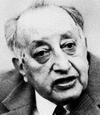- Asturias, Miguel Ángel
-
Asturias, Miguel Ángel. 1899-1974.
Guatemalan writer whose El Señor Presidente (1946) is often considered his greatest novel. He won the 1966 Nobel Prize for literature.
* * *
born Oct. 19, 1899, Guatemala City, Guat.died June 9, 1974, Madrid, SpainGuatemalan poet, novelist, and diplomat.He moved to Paris in 1923 and became a Surrealist under the influence of André Breton. His first major works appeared in the 1930s. He began his diplomatic career in 1946; it culminated in his serving as ambassador to France 1966–70. Asturias's writings combine a Mayan mysticism with an epic impulse toward social protest, especially against U.S. and oligarchic power. In Men of Maize (1949), often considered his masterpiece, he depicts the seemingly irreversible wretchedness of the Indian peasant. Other major novels, some of which employ the style of magic realism, are El Señor Presidente (1946), a fictional denunciation of Guatemala's dictator; The Cyclone (1950); The Green Pope (1954); and The Eyes of the Interred (1960). He won the Nobel Prize for Literature in 1967. Miguel Ángel Asturias.Camera Press
Miguel Ángel Asturias.Camera Press* * *
▪ Guatemalan author and diplomatborn October 19, 1899, Guatemala City, Guatemaladied June 9, 1974, Madrid, SpainGuatemalan poet, novelist, and diplomat, winner of the Nobel Prize for Literature in 1967 (see Nobel Lecture: “The Latin American Novel: Testimony of an Epoch” (Miguel Angel Asturias: Nobel Lecture)) and the Soviet Union's Lenin Peace Prize in 1966. His writings, which combine the mysticism of the Maya with an epic impulse toward social protest, are seen as summing up the social and moral aspirations of his people.In 1923, after receiving his degree in law from Guatemala's University of San Carlos, Asturias settled in Paris, where he studied ethnology at the Sorbonne and became a militant Surrealist under the influence of the French poet and movement leader André Breton (Breton, André). His first major work, Leyendas de Guatemala (1930; “Legends of Guatemala”), describes the life and culture of the Maya before the arrival of the Spanish. It brought him critical acclaim in France as well as at home.On his return to Guatemala, Asturias founded and edited El diario del aire, a radio magazine. During this period he published several volumes of poetry, beginning with Sonetos (1936; “Sonnets”). In 1946 he embarked upon a diplomatic career, continuing to write while serving in several countries in Central and South America. From 1966 to 1970 Asturias was the Guatemalan ambassador in Paris, where he took up permanent residence.In the 1940s Asturias's talent and influence as a novelist began to emerge with his impassioned denunciation of the Guatemalan dictator Manuel Estrada Cabrera (Estrada Cabrera, Manuel), El señor presidente (1946; The President). In Hombres de maíz (1949; Men of Maize), the novel generally considered his masterpiece, Asturias depicts the seemingly irreversible wretchedness of the Indian peasant. Another aspect of that misery—the exploitation of Indians on the banana plantations—appears in the epic trilogy that comprises the novels Viento fuerte (1950; The Cyclone), El papa verde (1954; The Green Pope), and Los ojos de los enterrados (1960; The Eyes of the Interred). Asturias's writings are collected in the three-volume Obras completas (1967).Additional ReadingRichard J. Callan, Miguel Ángel Asturias (1970), introduces Asturias's life and works. René Prieto, Miguel Angel Asturias's Archaeology of Return (1993), is the best critical study.* * *
Universalium. 2010.
